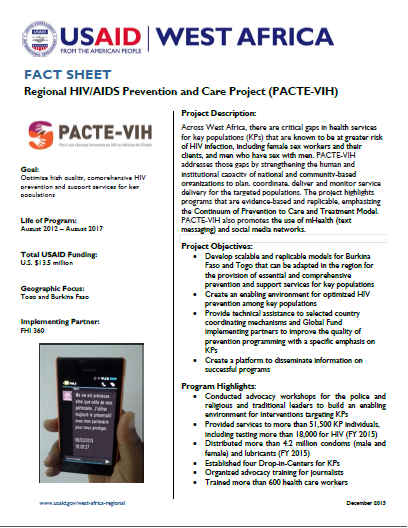Goal:
Optimize high quality, comprehensive HIV prevention and support services for key populations
Life of Program:
August 2012 – August 2017
Total USAID Funding:
U.S. $13.5 million
Geographic Focus:
Togo and Burkina Faso
Implementing Partner:
FHI 360
Project Description:
Across West Africa, there are critical gaps in health services for key populations (KPs) that are known to be at greater risk of HIV infection, including female sex workers and their clients, and men who have sex with men. PACTE-VIH addresses those gaps by strengthening the human and institutional capacity of national and community-based organizations to plan, coordinate, deliver and monitor service delivery for the targeted populations. The project highlights programs that are evidence-based and replicable, emphasizing the Continuum of Prevention to Care and Treatment Model. PACTE-VIH also promotes the use of mHealth (text messaging) and social media networks.
Project Objectives:
• Develop scalable and replicable models for Burkina Faso and Togo that can be adapted in the region for the provision of essential and comprehensive prevention and support services for key populations
• Create an enabling environment for optimized HIV prevention among key populations
• Provide technical assistance to selected country coordinating mechanisms and Global Fund implementing partners to improve the quality of prevention programming with a specific emphasis on KPs
• Create a platform to disseminate information on successful programs
Program Highlights:
• Conducted advocacy workshops for the police and religious and traditional leaders to build an enabling environment for interventions targeting KPs
• Provided services to more than 51,500 KP individuals, including testing more than 18,000 for HIV (FY 2015)
• Distributed more than 4.2 million condoms (male and female) and lubricants (FY 2015)
• Established four Drop-in-Centers for KPs
• Organized advocacy training for journalists
• Trained more than 600 health care workers








Comment
Make a general inquiry or suggest an improvement.